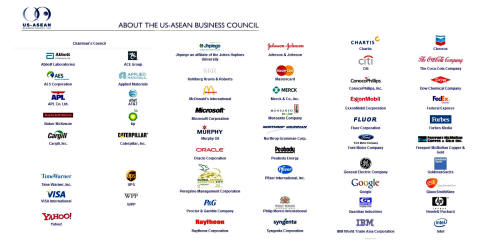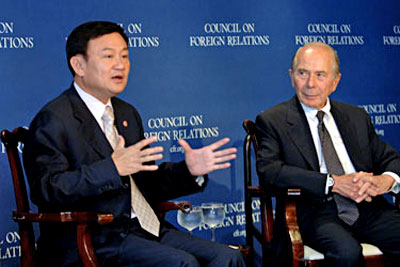|
March 6, 2012
Confounding was the Australian's (newspaper) recent op-ed titled, "Death of a ruthless autocrat," in regards to the late Hugo Chavez.
Confounding not for the op-ed's condemnation of
socialist policies or its criticism of Hugo Chavez, an obstruction to
Western corporate-financier interests in South America for over a decade,
but because of the obscene hypocrisy displayed throughout, from a newspaper
and
a corporate-financier-academic establishment in Australia that coddles a
figure in nearby Thailand that is every bit as guilty of everything it
accuses Chavez of.
The rambling narrative of the Australian equates to condemning Venezuela for not opening itself up to Western exploitation, domination by corporate-financier monopolies, and the folly of its challenging of the West's campaign of global aggression to,
In fact, the Australian itself makes a point of condemning Chavez for his support of Saddam Hussein, who's nation was occupied by the West during a brutal 10 year war, following a decade of sanctions that in total cost the lives of over 2 million Iraqis (including half a million children) and still counting.
The Australian implies that Chavez was wrong to
support Iraq, despite documented evidence that the Western assault on Iraq
was waged upon a patently false pretense.
Thumbing your nose at Washington and its interests is indeed a recipe for disaster, as has been thumbing your nose at brutal empires throughout human history.
Your nation will become the target of covert
military operations, terrorism, political subversion, and economic sabotage,
the very root of Venezuela's current malaise. Thumb your nose long and hard
enough at the West, and you may even become subject to an outright invasion,
as was the case in Iraq, Libya, Vietnam, and Afghanistan. Or, you may suffer
a long-term proxy war, as Syria now faces.
Not of being a "ruthless autocrat," or of being
a socialist, but of being independent and for having the nerve to challenge
the extraterritorial interests of an increasingly violent and unhinged West.
Populist, Socialist, Ruthless Autocrat, and Darling of
the West.
The Australian might start with Thaksin
Shinawatra of Thailand, propped up and coddled by the West since the
1990's, and to this day given free passage throughout the West despite being
a convicted criminal and a fugitive from the law in his native country.
In
a 2011 Australian news article preceding Thailand's national elections,
no where is found the same venomous language directed at Chavez in
describing Thaksin's own populist/socialist schemes. No mention at all is
made of Thaksin's grotesque human rights record - the worst in Thai history,
his intimidation of the press, and his habitual assault on any and all who
challenge him.
It would later be determined that most of the
those murdered were not even involved in the drug trade. Human Rights Watch
(HRW) would confirm this in their 2008 report titled, "Thailand’s
'war on drugs'," a follow up to the much more extensive 2004 report, "Not
Enough Graves."
And while the Australian fails to remind readers of this inconvenient fact, other Western propagandists, such as the Economist, boldly defend the mass murder that took place under his ruthless regime.
In its op-ed titled, "Thailand's drug wars: Back on the offensive," the Economist states:
The Economist would also go on to say:
The Economist finishes its op-ed by lamenting that the then military-led government which ousted Thaksin in 2006, had not kept up Thaksin's abhorrent, extrajudicial campaign of mass murder:
And more recently, the Huffington Post hosted Stanley Weiss of the Business Executives for National Security (BENS) and his op-ed titled, "The Oracle of Thailand," where he praises Thaksin Shinawatra's populist-socialist policies and suggests the US would be better off if it applied his "Thaksinomics" across America.
Weiss openly admits that Thaksin Shinawatra, despite being a convicted criminal and living in exile, is running the country by nepotist proxy.
Yet, he defends what he considers a brilliant exploitation of Thailand's desperately poor, notoriously under-educated rural population, spinning it as:
But not just anywhere:
Tapping unused reserves of credit in the state banking system, the team created one rural credit fund after another.
To lower household expenses, they offered low-cost housing and health insurance; provided subsidized credit for buying taxis and provided loans for children to get to school.
One might wonder how that is any different than what Hugo Chavez did in Venezuela, who also won over the population in part by using state money to subsidize his support base.
The difference is simple:
Weiss' BENS front
is lined with
representatives of America's Fortune 500 who have played a pivotal role
in both Thaksin' rise to power, and his continued relevance in Thai
politics.
He was appointed by the Carlyle Group as an adviser while holding public office, and attempted to use his connections to boost his political image.
Thanong Khanthong of Thailand's English newspaper "the Nation," wrote in 2001:
Upon becoming prime minister in 2001, Thaksin would begin paying back the support he received from his Western sponsors.
In 2003, he would commit Thai troops to the US invasion of Iraq, despite widespread protests from both the Thai military and the public.
Thaksin would also
allow
the CIA to use Thailand for its abhorrent rendition program.
...and currently also includes,
On the eve of the
military coup that ousted him from power, Thaksin was literally standing
before the Fortune
500-funded Council on Foreign Relations
giving a progress report in New York City.
Robert Amsterdam of Amsterdam & Peroff, would also simultaneously represent Thaksin's "red shirt" UDD movement, and was present for the inaugural meeting of the so-called "academic" Nitirat group, attended mostly by pro-Thaksin red shirts (who literally wore their red shirts to the meeting).
Additional
support for Thaksin and his UDD street-front is provided by the US State
Department via National Endowment for Democracy-funded "NGO"
Prachatai."
Socialism is not an internationally
unified political ideology. It is a set of tools that is only as good or as
bad as the hands that wield them. And just because these tools can be found
in two different hands, does not mean that both hands serve the same agenda
- no more so than would guns in two opposing armies' hands indicate a mutual
agenda or alliance.
It would appear that socialism is only "ok" if it is used to co-opt the
population for the interests of Wall Street and London. "Thumb your nose" at
the West, and it doesn't matter what socioeconomic strategy you employ, you
are a "ruthless autocrat" whose days are numbered and whose memory will be
immediately defiled upon your passing.
While the West itself
placates its population with socialism, such policies are condemned when
employed contra to their interests, especially when used to galvanize a
population against Western advances - as was the case in Chavez' Venezuela.
The true test of a government is not whether it uses socialism or not, but with what other tools it employs it. A nation must seek to build upon socialism's stop-gaps with sustainable, pragmatic solutions.
Outside of Wall Street and
London's international order, many nations are doing just that, but progress
is difficult to gauge when the West arrays the summation of its influence
and power against such progress.
The ruling
elite, whichever side they stand on, do not see such systems as unifying
ideologies, but merely tools. It is time for the general population to look
at how these tools are used, and whose hands they are actually in, instead
of fixating on the tool itself as being inherently "good" or "bad."
In the case of Hugo Chavez and Venezuela, the chasm between his movement and the West's use of socialism couldn't be any deeper or wider.
|



